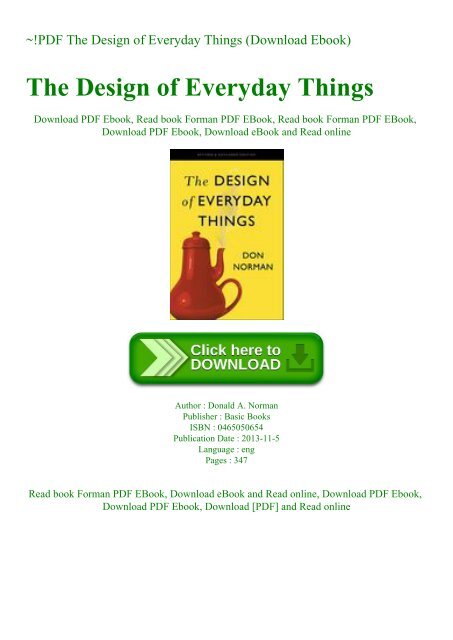


The rules are simple: make things visible, exploit natural relationships that couple function and control, and make intelligent use of constraints. The Design of Everyday Things shows that good, usable design is possible. The problems range from ambiguous and hidden controls to arbitrary relationships between controls and functions, coupled with a lack of feedback or other assistance and unreasonable demands on memorization. The fault, argues this ingenious - even liberating - book, lies not in ourselves, but in product design that ignores the needs of users and the principles of cognitive psychology. This book is the reason why doors that don’t work the way we expect them to are now called “Norman doors.” This blog post was made in loving memory of campus’s favorite “Norman doors,” the former UGL Doors, 1969-2016.Design doesn't have to complicated, which is why this guide to human-centered design shows that usability is just as important as aesthetics.Įven the smartest among us can feel inept as we fail to figure out which light switch or oven burner to turn on, or whether to push, pull, or slide a door. Why such a counter-intuitive rule? Because, invariably, the problem I am asked to solve is not the real, fundamental, root problem. Norman makes a clear, concise, if a little repetitive at times, argument for how we can make the world a better place through better design through a combination of psychology research, jokes, anecdotes, and serious industry examples, peppered with Norman’s rules to live by from his years of design experience, such as his rule of consulting: “I never solve the problem I am asked to solve.

There is a mismatch between the two, one that can lead to enhanced capability if used properly” – (Norman, 2013)Īn update on his 1988 book, The Psychology of Everyday Things, this book continues on the themes of designing for human imperfection and imprecision with new examples. Machines are rigid, precise, and relatively fixed in their operations.

“People are flexible, versatile, and creative. This book is available for reading in the Scholarly Commons and online through the University Library Catalog. Designer, psychologist, and respected industry expert Don Norman wants to change your life and the way you see the world and his classic book The Design of Everyday Things might just do that.


 0 kommentar(er)
0 kommentar(er)
